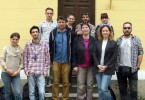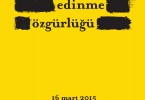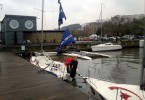Niyazi Dalyancı
For the first time in Turkey demands for the resignation of an army chief was publicly voiced this week after the news that the original copy of the so-called “Action Plan” to topple the government of Prime Minister Tayyip Erdogan has been received by the public prosecutors, hit the newspaper headlines.
Chief Istanbul Prosecutor Turan Colakkadi confirmed that the original copy of the plan which was allegedly drafted at the headquarters of Turkey’s General Staff was posted by an unidentified informer who is said to be a high-ranking officer.
The action plan topped the political agenda in Turkey in June when it was published by the Taraf newspaper leading to a heated debate over the role of the army in politics. However, the prosecutors at that time said that they only had a photocopy of the document making it impossible to establish whether it was fake or real.
It was again Taraf that published the informer’s letter and broke the news that the original copy of the action plan was in the hands of Istanbul prosecutors. The newspaper has been the source of many such revelations leading to allegations that the government is using it as a medium to leak secret information mainly against the army.
The action plan signed by Col. Dursun Cicek, contained measures such as planting weapons at houses used by the Fethullah Gulen sect, which is a politically and financially powerful Islamic sect supporting the Erdogan government, and other steps to discredit the Justice and Development Party (AKP) of the prime minister.
Col. Cicek was questioned by the prosecutors during a brief detention but was released later. Turkey’s Chief of Staff Gen. Ilker Basbug described the document “as a piece of paper” and vehemently denied that it came out of his headquarters. He demanded from civilian authorities “to find out who produced this piece of paper and what their purpose in fabricating such a plot was.”
Ergenekon prosecutors announced that the original copy was submitted to forensic study and experts said the signature did really belong to Col.Cicek.
“Gen. Basbug either deliberately lied to his people or reduced to a commander who is being manipulated by his staff,” Hurriyet columnist Cuneyt Ulsever wrote after the announcement. At a news program aired by one of the Turkish television channels Ulsever agreed with his colleague Nazli Ilicak, that the only way left for Basbug is to resign.
In a handwritten five-page letter sent to the prosecutors with the original copy of the action plan, the unidentified informer claimed that Basbug did know about the plan which was prepared under orders from Gen. Hasan Igsiz who is now serving as the commander of the 1st Army in Istanbul. The letter also said that after the photocopy of the plan was made public in June by the media, 40 sacks of documents have been destroyed and the data relating to the plan on hard discs of computers at the General Staff headquarters were irrecoverably deleted.
Is the Action Plan a ploy to distract public attention?
The resurrection of Turkish military’s alleged action plan comes in the midst of another fiery public debate over the “Kurdish opening” and the return of 34 Kurds with Turkish citizenship from northern Iraq.
Eight members of the group, four men and four women, were coming from the PKK stronghold on the Kandil mountains in Iraq while 26, four of them infants, were inhabitants of the Mahmur refugee camp housing Kurds who escaped to northern Iraq from Turkey. The PKK members were wearing the khaki uniforms with baggy trousers of the Kurdish guerrillas.
The group was met at the border by a crowd of more than 10 thousand in jubilation, dancing and singing, carrying PKK colors and posters of PKK leader Abdullah Ocalan who is serving a life sentence on his prison island in the Marmara Sea.
After a brief questioning by prosecutors, judges set all 34 free and the group left the border point in a mile-long motorcade carrying them, their supporters and leaders of the pro-Kurdish Democratic Society Party (DTP). At every town on their way to Diyarbakir, the group received heroes welcome from the people.
It was not only the local people who welcomed the returnees. The counselor of the Interior Ministry and the chief of Turkey’s intelligence organization, MIT, were also there to monitor the event.
Five special prosecutors from Diyarbakir and neighboring provinces were also present to question the PKK members and Kurdish refugees. During their interrogation, they were asked questions like, “When did you join PKK?, When did you leave Turkey? Did you take part in armed assaults on Turkish security forces? etc.”
According to Turkish press, none of the returning Kurds asked to be treated under the stipulations of the so-called Repentance Law which exempts from criminal prosecution those who collaborate with the authorities and express repentance. Most of them said they were coming back because their leader, Ocalan, sent them a message to enter Turkey to contribute to the peace effort.
In September, Ocalan asked PKK to make a goodwill gesture by sending several members home both from “the mountain” as the locals call the guerrilla headquarters and also from Europe. According to press reports the PKK chiefs agreed.
Although the move was met with jubilation in the southeastern provinces predominantly populated by Turkey’s Kurdish citizens, harsh reaction came from other quarters like families of the Turkish soldiers killed during fight with PKK. In Ankara, a group of veterans and families of killed soldiers gave back the medals awarded them because of distinguished service to the nation.
Extreme rightwing Nationalist Action Party (MHP) leader Devlet Bahceli went as far as accusing the government of treason while Deniz Baykal, the leader of the main opposition Republican Peoples Party deplored the special treatment accorded to the returning PKK members.
The first group was going to be followed by another 14 PKK members coming from European countries to Istanbul. DTP announced that they would be welcomed by a rally in Istanbul.
At this point Prime Minister Erdogan stepped in and announced that there would be no more returns because of the way the first group was welcomed leading to public reaction.
“We don’t want to see the repeat of scenes in Habur,” Erdogan said. “What we have witnessed during the return of the 34 people is obvious. This has led to serious discomfort within the people. We have started this as a project of national unity. We cannot afford to destroy one side while mending the other. This is why the return of those from Europe has been postponed,” announced Erdogan.
The resurfacing of the action plan against the government at a time when Erdogan announced the suspension of the “Kurdish opening,” prompted the opposition to imply whether this was a ploy to distract public attention from the Kurdish issue.
CHP leader Deniz Baykal addressing his deputies in the parliament asked the question why the original copy of the document was not brought before the public four-and-a-half months ago when it was on the agenda.
“We understand from the letter sent by the informer that he was in possession of the original copy four-and-half months ago. It is obvious that if the document was revealed then, the investigation would have shed light on the whole affair; so why it was held for four months and made public now? What has transpired between then and now,” said Baykal.
Sahin Mengu, a CHP deputy in a written question to Justice Minister Sadullah Ergin asked him to clarify, “How secret documents supposedly held by prosecutors are leaked to the newspapers. Is this done in order to distract the agenda of the day?”






